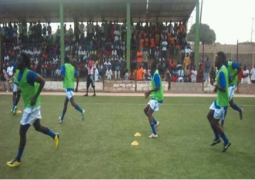The communication strategies focused on nine thematic areas comprising maternal nutrition; promoting optimal infant and young child feeding practice; preventing micronutrient malnutrition; nutrition and infectious diseases; nutrition and HIV/AIDS; improving food standards quality and safety; preventing and managing diet-related non-communicable diseases (diabetes and hypertension); and nutrition in emergency situations.
The messages were developed by NaNA in collaboration with partners with the purpose of guiding and facilitating behavioral change, communication on nutrition and related issues involving various categories of program participants and audiences across the country.
Malang Fofana, deputy director of NaNA, said the strategic document is meant for Gambians and it is designed to address nutrition in the country, noting that it will go a long way in changing people’s behavior.
“There is a component for advocacy and policy makers to look at critical issues highlighted that government and partners need to address in order to achieve the desired objective,” he stated.
The importance of the forum, he said, cannot be over-emphasized, because some time ago, communication strategies for nutrition were developed with the help of experts from various fields.
“The strategies were well-written, as it has to be communicated to the people to understand key behaviors that they want to change,” he added
This, he went on, is why the World Bank funded the program to ensure that critical issues of concern in the document are fished out.
“That is why it is important to sit together and work collectively to use all the key messages that we think are relevant in changing people’s behavior for the better,” Fofana noted.
“There is a lot in the document concerning nutrition, and its related issues that experts have taken and, hopefully, the public will understand the messages used and behaviors to be adopted.
“There is a feeling that the document after the six days can be ready for use by any potential communicator, organization, ideal trainers or trainees in issues of nutrition and health or inter personal communication for Gambians,” he further stated.
Dilating on the role of men in promoting nutrition, he said, it is critical and it is the responsibility of every man to make sure that their families are protected.
Women should be helped, because if their nutritional status is not improved then that of the men cannot be. Therefore, he noted, the active involvement of men is required by helping women in household work.
“Women work for long hours and they are caring and surely nurture their families. In order to effectively do it, then men should play their role well in providing the nutritional needs of their families.
Their role in promoting nutrition is key and that is why some of these messages touch on women and some called on men to be fully involved in making sure that their families consume the required amount of nutrition,” he explained.
If women are malnourished and deprived of their nutrient needs, then men will not also be able to adequately meet theirs. Men and women must work collectively to make sure that the issues of nutrition are addressed,” he stated.
Abdou Aziz Ceesay, NaNA IEC Officer said the aim and objective of the message development exercise is to complement the nutritional strategy that NaNA and partners were developing for the past two months.
He noted that a recommendation by IEC experts that a proper nutrition message development workshop should be put in place was the reason why this massage development activity was held as an annex for the proper implementation of nutrition communication.
The intended users of the booklet, he said, are individuals, groups or organizations involved in health and nutrition communication.
Ceesay said the forum is held in the West Coast Region because developing a message needs a lot of concentration and work in order to come up with strong and suitable messages that will be useful to users and receivers, thereby giving the document the attention it deserves.
Saikou Omar Dibba, a communication specialist at the University of The Gambia said if these messages are practiced, behaviors and attitudes will be adapted to a significant level, and will definitely see a change and improvement in the health indicators by reducing maternal mortality, infant mortality and young child feeding, among others.
Dibba said the mortality rate will reduce, because these are key in the health sector of any country, and once they are improved, it has an effect on national economies.
He called on the public and private sectors, NGOs involved in health and nutrition, key civil society organizations, the media, policy makers and donor agencies to join hands with NaNA to coordinate and create an enabling environment for the actors to play their part.
Dibba expressed hope that all partners will rally, and put their forces together to implement the national nutrition strategy.



